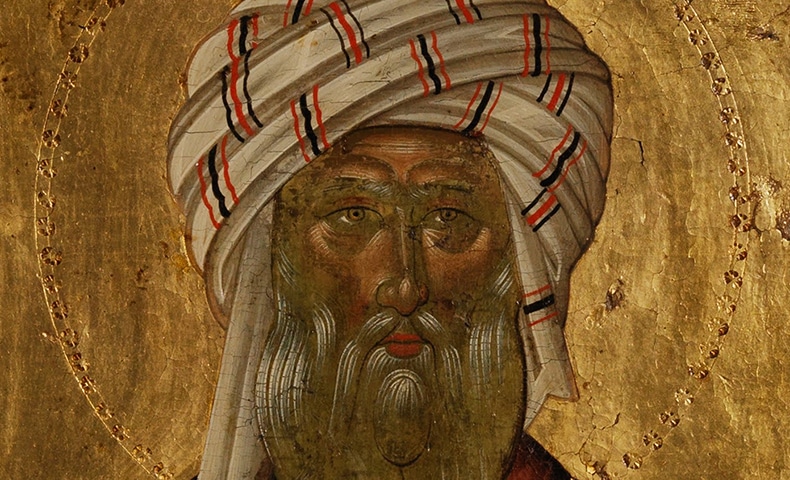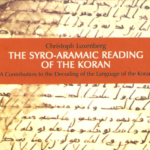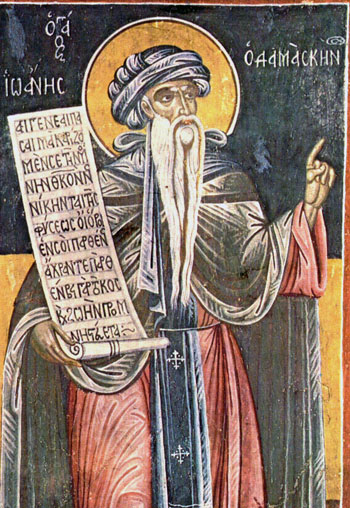
The work entitled On Heresies [1]by John of Damascus says the following: “after having chanced upon the Old and New Testaments, a false prophet set down some ridiculous compositions in this book of his and he gave it to them as an object of veneration.”
BY NAFI SHABOU
THERE WAS NOTHING TERMED ‘Islam’ during the reign of John of Damascus. He termed it a heresy or the ‘religion of the Ishmaelites’ and never called it the religion of Islam. The Qur’ānic text was not fixed in its current form for all the ‘Muslims’ by that time. Instead there were divergent versions of the Qur’ānic text, at times differing on one and the same subject. John of Damascus relates how:
From [the time of Emperor Heraclius 610-642 AD] to the present [i.e. the time of John of Damascus 676 AD], a false prophet named Mamed appeared in their midst. This man, after having chanced upon the Old and New Testaments and likewise, it seems, having conversed with an Arian monk,[2] devised his own heresy. Then, having insinuated himself into the good graces of the people by a show of seeming piety, he gave out that a certain book had been sent down to him from heaven.[3]
and added:
Their claim (the Ishmaelites) that the Qur’ān was revealed to Muhammad while he was sleeping is spinning dreams.[4]
In an epistle sent by ‘Abd al-Masīḥ al-Kindī to ‘Abd Allāh al-Hāshimī during the era of Al-Ma’mūn[5] we come across the truth about the forgery, the distortion, the additions and manipulation of the Qur’ānic texts. This epistle is one of the most important ancient documents testifying to the fact that the first (Christian) Qur’ān was distorted. On the subject of the Qur’ān ‘Abd al-Masīḥ al-Kindī writes:
You should first know that the reason this book came about was because a Christian monk named Sergius[6] did something that his companions denounced him for. As a result they forbade him from entering the church and shunned speaking to him and addressing him, as is their wont to do in such situations. He regretted what he had done and intended to do something that that would justify himself to his fellow Christians. So he journeyed to Tihāma and toured the region until he reached Makka. He saw that in this land there were two forms of religion: the religion of the Jews and idolatry. He continued to ingratiate himself with your master and deceive him until he managed to win him over. He gave him the name Nestorius because by changing his name he hoped to firmly establish Nestorius’ views which he had adopted and practiced as his faith.[7] He continually accompanied him and discussed with him in private and explaining things to him until he managed to make him cease his idolatry. He then made him a student of his and a preacher to call others to Nestorianism.[8]
When the Jews came to know of this, they became hostile to him, and reminded him of the ancient issue that Jews had with the Christians, and things escalated. This is the reason why his book [the Qur’ān] makes mention of Christ and Christianity, and defends it, and recommends his people to testify that they bear deep affection towards it, because there are priests and monks among them and because they do not behave proudly.[9]
Now just when it appeared that the influence of Christianity was growing stronger, Nestorius passed away. Whereupon ‘Abd Allāh ibn Sallām and Ka‘b al-Aḥbār, both of them Jews, by malice and cunning convinced him that they were followers of him and his teaching. The continued their deceit and manipulated him all the while concealing what they truly believed until finally, after his [Muḥammad’s] death, finding their opportunity.
When he [Muḥammad] had died, and his people had apostasised and Abū Bakr had taken over, ‘Alī ibn Abī Ṭālib remained aloof and refused to accept his authority, knowing that ‘Abd Allāh ibn Sallām and Ka‘b al-Aḥbār had got their way with what suited them. So then ‘Alī ibn Abī Ṭālib insinuated themselves with him and asked him: “Why do you not claim prophethood? For we agree with you as to what Nestorius the Christian was teaching your master, and you are in no way inferior to him?
Now ‘Alī ibn Abī Ṭālib was persuaded by them for he was still an inexperienced youth at the time. But God did not grant that their purpose was to be fully fulfilled, since some news about them reached Abū Bakr, who sent for ‘Alī. When he attended he reminded him of the sin he would be committing. ‘Alī took stock of Abū Bakr and his power and thus relented and deferred to him.
But the two Jews had already worked upon that book passed to ‘Alī ibn Abī Ṭālib from his master [Muḥammad] in the form of a Gospel. They had inserted into it stories from the Old Testament and some of its laws, as well as stories they had concocted themselves. They replaced or deformed in [the Qur’ān] some of these stories, adding to them, or omitting parts from them before inserting them, such as the passage:
And the Jews say the Christians follow nothing (true), and the Christians say the Jews follow nothing (true); yet both are readers of the Scripture. Even thus speak those who know not. Allah will judge between them on the Day of Resurrection concerning that wherein they differ. [10]
And there are some astonishing inconsistencies that induces one to view it as the product of different people speaking, each contradicting the words of the other, such as the sūras al-Naḥl, al-Naml and al-‘Ankabūt and others like them.
When ‘Alī despaired of command [i.e. the Caliphate] being transferred to him he went to Abū Bakr after 40 days had passed (although some say after six months) and pledged his allegiance to him and placed his hand in his, whereupon Abū Bakr said to ‘Alī: “Why were you absent when the pledge of allegiance was being made?” To which he replied: “I was busy collecting together the Book of God as the Prophet had instructed me to do”. Now what could this mean, his being busy ‘collecting together the Book of God’?
Al-Kindī then adds some portentous words:
And you (referring to ‘Abdullāh al-Hāshimī) should know that al-Ḥajjāj ibn Yūsuf also collected together the Qur’ān and left out many things from it. You know that the first copy was in the hands of the Quraysh, and that ‘Alī ibn Abī Ṭālib gave orders for it to be seized when things became serious in order to prevent anything being added or removed from it. This was the copy that accorded with the Gospel that had been given to him by Nestorius, that is, Sergius, known as the monk Baḥīra whom his colleagues at times called ‘Jibrīl’,[11] or the ‘Faithful Soul’. When ‘Alī said, at the pledge of allegiance to Abū Bakr: “I was busy collecting together the Book of God”, their reply was: “You have some sayings [of the Prophet], and we have some others”.
At this point al-Kindī wonders:
Is the Book of God something to be ‘collected together’? Well, they gathered and collected together all the pieces that people could remember, such as the sūrat al-Tawba which they took from a certain Bedouin Arab who had arrived there from the desert, and other portions from here and there, and bits that had been written on pieces of cloth or shoulder blades and the like, but which were not written on pages. They also had some leaves and scrolls – after the fashion of the Jews – and this was part of the Jewish trickery.
Then al-Kindī refers to something most significant about the first Qur’ān:
Now people read it differently. Some read it according to the version of ‘Alī ibn Abī Ṭālib and his followers, and have done so up to the present time[12], others read it according to the version we have mentioned, and still others read it according to the version of that Bedouin from the desert.[13] This Bedouin said that he had some passages and verses, or less or more than this, and these were written down without knowing the tale they belonged to or the revealed passage they referred to. There is also a group who read Ibn Mas‘ūd’s version,[14] since your master [Muḥammad] had said: “Anyone wishing to read the Qur’ān in its pristine purity and freshness, should read from Ibn Umm ‘Abd” [15] … and there is another group reading according to the version of Ubayy ibn Ka‘b[16] on the grounds of Muḥammad’s words: “Your best reciter is Ubayy”. The readings of Ubayy and Ibn Mas‘ūd are closely alike.

Suggested Reading
Now when ‘Uthmān ibn ‘Affān acceded to power and people differed as to how the Qur’ān should be read, ‘Alī ibn Abī Ṭālib sought grounds to accuse him, citing the errors being made in how the Text was being read and censuring him for this (his purpose was to secure his execution). One man would read a verse one way, and another man another way … the text was thus being added to or sections omitted, or distorted or altered.
[1] St. John Damascene, Περὶ αἱρέσεων ἐν συντομίᾳ ἑκατόν, ὅθεν ἤρξαντο καὶ πόθεν γέγοναν (‘Heresies in Epitome: How They Began and Whence They Drew Their Origin’). The work is from Part Two of his monumental Fount of Knowledge. (Ed.)
[2] This may be the Nestorian monk Baḥīra (George or Sergius) who met the boy Muḥammad at Bostra in Syria and claimed to recognize in him the sign of a prophet. (Ed.)
[3] Μάμεδ ἐπονομαζόμενος, The text is published in Migne, Documenta Catholica Omnia. p.763 ff (Ed.)
[4] The full text of this passage runs: “When we say: ‘How is it that this prophet of yours did not come in the same way, with others bearing witness to him? And how is it that God did not in your presence present this man with the book to which you refer, even as He gave the Law to Moses, with the people looking on and the mountain smoking, so that you, too, might have certainty?’—they answer that God does as He pleases. ‘This,’ we say, ‘We know, but we are asking how the book came down to your prophet.’ Then they reply that the book came down to him while he was asleep. Then we jokingly say to them that, as long as he received the book in his sleep and did not actually sense the operation, then the popular adage applies to him (which runs: You’re spinning me dreams).” (Καὶ τὸ γελοιῶδες πρὸς αὐτοὺς λέγομεν ἡμεῖς, ὅτι λοιπόν, ἐπειδὴ κοιμώμενος ἐδέξατο τὴν γραφὴν καὶ οὐκ ᾔσθετο τῆς ἐνεργείας, εἰς αὐτὸν ἐπληρώθη τὸ τῆς δημώδους παροιμίας). (Ed.)
[5] The date of the Apology is not fully established. The earliest surviving manuscripts of the Arabic text date from the seventeenth century but are predated by a twelfth-century Latin translation made in Spain, where the Arabic text is assumed to have been circulating among Mozarabs (Christians under Muslim rule). (Ed.)
[6] That is, Baḥīra.
[7] The Biography of the Prophet (al-Sīra al-Nabawiyya) refers to a monk named ‘Nisṭūr’ who ‘recognised Muḥammad as a prophet’.
[8] The polytheists of Quraysh claimed that some person taught Muḥammad religious doctrine, but the Qur’ān denies this saying: And We know well that they say: Only a man teacheth him. But the speech of him at whom they falsely hint is foreign, whereas this is clear Arabic speech. [Qur’ān XVI (al-Naḥl), 103. The Latin text of the epistle adds: Et ita factum est. ut ab isto monacho aliqua de ueteri et nouo testamento edoctus, ipsa in Alcorano suo fabulose et mendose intexeret (‘and so it was that when he was instructed by this monk in some passages from the Old and New Testament, he deceitfully and fictitiously weaved these into the body of the Qur’ān’) See Fernando González-Muñoz, Exposición y refutación del islam. La versión latina de las cartas de al-Hāšimī y al-Kindī La Coruña, 2005, pp. 67-68. (Ed.)
[9] Al-Kindī is here quoting Qur’ān V (al-Mā’ida), 82]: Certainly you will find the most violent of people in enmity for those who believe (to be) the Jews and those who are polytheists, and you will certainly find the nearest in friendship to those who believe (to be) those who say: We are Christians; this is because there are priests and monks among them and because they do not behave proudly. (Ed.).
[10] Qur’ān II (al-Baqara), 113.
[11] Islamic doctrine has Muḥammad receiving the Qur’ān revealed to him by Jibrīl, i.e. the Angel Gabriel.
[12] Al-Kindī is here referring to the Shī’a, who are the ‘party of ‘Alī’.
[13] The Islamic heritage has not made mention of this version.
[14] The author of this article refers to Ibn Mas‘ūd as a Jew before his conversion.
[15] Ibn Umm ‘Abd is another name for Ibn Mas‘ūd.
[16] Ubayy ibn Ka‘b was of the Jewish tribe the Banū Khazraj. Ubayy ibn Ka‘b was known as the ‘master of reciters’, c.f Musnad Aḥmad, I, 275.
Main image: St John of Damascus (675-749 AD) depicted with his Arab headdress.
On this essay read the earlier sections: Part One; Part Two; Part Three; Part Four; Part Five, Part Six; Part Seven

